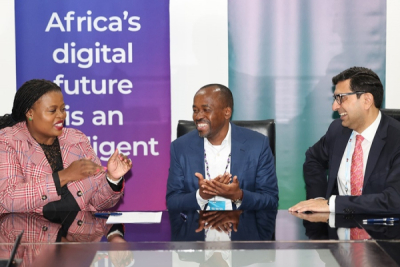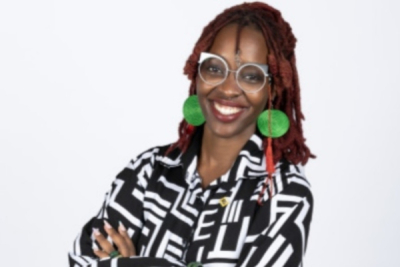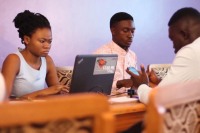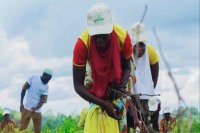South African insurtech Pineapple announced on Thursday, November 16, via its social networks, the successful completion of a 400 million rand (approx. $21.9 million) Series B funding round. "This funding round stands as a testament to our tech and AI-powered operating model, enabling our mission to offer affordable and comprehensive insurance to all South Africans," said Pineapple co-founder Marnus van Heerden.
mHub, a key player in Malawi's technology ecosystem, promotes innovation and entrepreneurship. It has already created a thousand jobs and trained tens of thousands of young people.
mHub is Malawi's first technology and innovation hub, located in Lilongwe, with workspaces in Blantyre (Malawi) and Lusaka (Zambia). Founded in 2014, the hub's mission is to promote technology, entrepreneurship, and innovation in Malawi. It offers tailored technology solutions, entrepreneurship support, and digital skills training for Malawian youth and businesses.
The center was initiated by Rachel Sibande, a Malawian computer scientist and social entrepreneur. A fervent advocate of technology in Africa, she was featured on the Forbes list of Africa's 30 most promising young entrepreneurs in 2016.
mHub offers creators tailored entrepreneurial support, software development services, co-creation opportunities, digital skills, and on-demand startup assistance. It also hosts programs and activities to strengthen Malawi's entrepreneurial and innovative ecosystem. One such program is Digital Malawi, a project that has benefited over 500 young people, some of whom have received funding of around $2,500 as seed capital for their businesses.
The Modern Cooking for Healthy Forest Accelerator (MCHF), a project aimed at improving forest management and mitigating land-based emissions, is another of the center's initiatives. It has trained 94 entrepreneurs and linked 20 participants with beneficiaries, thereby contributing to sustainable forest management.
In partnership with Care Malawi, mHub has also set up a project called Ntchito Mbambande. This focuses on improving employability and self-employment opportunities for young people. It is mainly funded by the European Union (EU) and operates in five development districts: Blantyre, Machinga, Salima, Dedza, and Mzimba.
Since its inception, mHub Malawi has facilitated over $1 million in funding for emerging entrepreneurs, created over 1,000 jobs, and trained over 42,000 young people in business and technology. In 2018, mHub won the Most Innovative Organization award at the Cloud Awards and the IOT Awards.
Melchior Koba
In recent years, the African continent has witnessed a proliferation of startups. However, in numerous countries, authorities have not sufficiently supported their growth. Recognizing this gap, Kampala has decided to address the issue.
Uganda is planning to introduce a national policy for startups. The project, led by the Private Sector Foundation Uganda (PSFU), is supported by the Mastercard Foundation and coordinated by the Ugandan Ministry of Commerce, Industry, and Cooperatives. The aim of the policy is to govern interactions between the government, incubators, startups, and investors, with a view to promoting a culture of innovation and entrepreneurship in the country.
"Several multinationals come here and get several business facilitation privileges yet not so much is done for local start-ups. We believe that with this policy, Ugandan start-ups will have a chance to compete favorably on the market as it will not only establish what they need but also how to get support," said Keneth Twesigye, lead policy at Startup Uganda.
Uganda is actively enhancing its technological ecosystem. To qualify as a startup in the country, specific conditions must be fulfilled. These include maintaining a temporary management structure, allocating a portion of the budget to research and development, having majority ownership by Ugandans, and being locally incorporated in Uganda.
Let’s note that in Africa, the technology ecosystem is booming. African startups attract investors from all over the world, but for a variety of reasons, the largest share of funds is invested in Nigeria, South Africa, and Kenya. In the "Venture Capital Activity in Africa Q3 2023" report published by the African Private Equity and Venture Capital Association (AVCA), over $2.95 billion was invested in African startups in the first nine months of 2023.
Adoni Conrad Quenum
The South African government is stepping up initiatives to accelerate the adoption of broadband Internet as part of its digital transformation ambitions. It is supported in its efforts by a number of key international partners.
The International Finance Corporation (IFC) and South African investment bank Rand Merchant Bank (RMB) recently committed to investing a total of $49.2 million in the Eastern Cape fibre project piloted by Liquid Intelligent Technologies. Each of the two parties will invest 450 million rand ($24.6 million).
"Not only will this investment from RMB and IFC help fund the expansion of our fibre backbone network in the Eastern Cape, but it will also help us upskill more South Africans and create employment. We believe this collaboration sets a new benchmark for the financing and development of digital infrastructure in South Africa," said Hardy Pemhiwa (photo, center), Group Chief Executive Officer of Liquid Intelligent Technologies.
The funding granted to Liquid Intelligent is part of the three companies' collective commitment to advancing broadband connectivity in South Africa in general, and particularly in Eastern Cape, one of the country's least connected regions.
According to statistics quoted by Liquid, only 65% of households in the Eastern Cape have access to the Internet. What's more, only 5% of the province's households have Internet access from home, which is twice as low as the South African average, where 10% of the total population has Internet access from home.
Ultimately, the project will reduce the digital divide in the Eastern Cape and extend Internet access to underserved areas. The aim is to support the South African government's National Development Plan to achieve 100% broadband coverage in the country by 2030.
Samira Njoya
Determined to provide Africans with a social networking platform designed just for them, three young Africans have embarked on the adventure of digital entrepreneurship. Their solution is named Umojja, which means "unity" in Kiswahili, a Bantu language spoken in many parts of the continent.
Umojja is a social networking platform developed by a Congolese startup. It enables users to access a variety of creative content, news, and personal moments shared by other platform users. The startup, based in the city of Goma and founded by Congolese Charles Muleka Kitwa Djo Kyadi and Nigerian Temilade Oduwalo, launched its solution in 2023.
"Leveraging the lessons learned from the ravages of war, Umojja aims to provide a secure platform for young people to exchange information. Our focus is on fostering not only the development of our own country but also contributing positively to others, given that our nation is already a member of various organizations. By connecting through Umojja, we strive to extend these benefits beyond our borders, facilitating mutual growth and collaboration," said Charles Muleka Kitwa.
Currently, the solution features only an Android application. Users, whether on the web platform or the mobile app, can register by inputting various personal details, including their name, email address, telephone number, gender, and country of origin. Upon successful registration, users gain access to the platform, enabling them to follow content creators, news media accounts, and other users.
Umojja offers users a range of features, including the ability to broadcast live videos, make video calls, place ads, create a company page, conduct polls, share videos, and send text messages. The platform actively combats the dissemination of fake news. It adopts a unique approach by compensating content creators based on the viewership of their videos. Since the launch of its mobile app in July 2013, it has been downloaded over a hundred times, according to Play Store data.
Adoni Conrad Quenum
Christine Namara is one of Africa's leading investors and mentors most committed to the development of the technology ecosystem. Her appointment to Flat6Labs is proof of her expertise and commitment.
Christine Namara (photo) is a Kenyan businesswoman, investor and mentor. On Wednesday, November 15, 2023, she joined leading MENA seed-stage venture capital firm Flat6Labs as a partner in its Africa Seed Fund (ASF).
"With innovation as our compass and collaboration as our engine, I am honored to join Flat6Labs, a pioneering force in shaping Africa’s entrepreneurial landscape. Together, we will embark on a transformative journey, unlocking the vast potential of startups across the continent. In this interconnected world, every idea has the power to change lives. I am excited to champion these innovations, catalyzing progress and leaving a lasting impact on communities in Africa and beyond," Ms. Namara said, according to a release published by Flat6Labs.
The Africa Seed Fund she is joining was recently set up by Flat6Labs to extend its reach in Africa. The $95 million investment vehicle targets North, West, and East African regions, to invest in over 160 seed-stage startups in the region's tech ecosystem.
With her wealth of venture capital and private equity experience, the new partner will be a key asset in achieving the fund’s objectives. Indeed, in 2012, she graduated from Uganda Christian University with a Bachelor's degree in Economics and Management, specializing in Law and Business Policy. She then kickstarted her professional career as an executive administrator trainee at the Institute of Customer Service Kenya the same year. In 2013, she worked as an intern at CS Consulting Ltd. as well as a member of the customer service and marketing team at Thornsoft International.
Later, in 2021, Christine Namara joined The Baobab Network, a Nairobi-based accelerator that invests in early-stage technology companies across Africa, as a senior venture capital partner. The following year, she was appointed Head of Enterprise at the same accelerator, a position she held until October 2023.
Melchior Koba
O'Botama catalyzes innovation and is a driving force for entrepreneurial change in Africa. It provides support, training, and assistance to young entrepreneurs in securing financing for their businesses.
The O'Botama Collaborative Innovation Workshop (AIC) is a business incubator based in Cameroon. Since 2018, it has been supporting local Cameroonian entrepreneurs and those from the diaspora in the development of their businesses. It was created by the collective O.S.E.R. L'Afrique (a non-profit association established by the diaspora) and is headed by Benjamin Ngongang, an experienced professional in the financial and investment sector.
AIC is dedicated to catalyzing talent and strengthening the entrepreneurial spirit among young Africans, guiding them in creating innovative solutions for their region. To fulfill this mission, AIC provides comprehensive support to project leaders from conceptualization to value proposition assisting in the implementation of their innovation or activity, aiding in the search for financing, and facilitating connections with suitable partners.
It features a coworking space that regularly welcomes professionals and an online platform for events, training, and diverse services, it offers an incubation program specifically designed to support and accelerate innovative projects with a social impact. Program members receive tailored training sessions to address their unique needs, coupled with expert guidance to ensure the successful development of their businesses.
The incubator also has a center of expertise where a team of experts offers technical assistance, consultation, and training in the fields of law, taxation, labor and social security, project management, accounting, and finance. It also offers training in business management, digital marketing, accounting management, and personal development.
Since its creation, O'Botama has supported over 40 companies and project leaders in Cameroon and welcomed over 1,000 participants to its activities. It regularly hosts 111 coworkers in its shared workspace. A member of the AfriLabs network, the incubator is supported by Afric'Innov, Genius Center, Kmer Tech, Fiatope, and Objis, among others.
Accra will host the first edition of the Global Conference on Cyber Capacity Building (GC3B) from November 29 to 30.
The GC3B, organized under the theme "Cyber Resilience for Development", aims to build a bridge between politicians and cybersecurity industry leaders. The aim is to contribute to the advancement of cyber capacity building on a global scale. Over 800 cybersecurity experts are expected at the conference.
While presenting promising prospects and undeniable opportunities, technological advances can pose challenges in combating crimes, especially in Africa. This compels defense and security forces to improve their capabilities, notably those related to cybersecurity.
Last Monday (November 13), the Chinese Embassy handed a digital forensics laboratory to the Seychelles police’s cybercrime division. According to the Seychelles News Agency, the laboratory was handed out by Mu Jianfeng (photo, left), Chargé d'Affaires of the Chinese Embassy in Seychelles.
The laboratory is funded, to the tune of one million Yuan ($137,000), by the Chinese government. "The laboratory will be fully operational in the next few days, and its main functions include secure data extraction, storage media backup, rapid data acquisition, data analysis and authentication, and data recovery. It will be an effective tool for the Seychelles police and relevant authorities in digital data investigation and evidence collection," said Mr. Jianfeng.
The new laboratory comes at a time when the Seychelles government is stepping up measures in response to a growing rise in cybercrime in the country. In November 2021, a new law on cybercrime and other related offenses came into force in the country after being approved by the National Assembly.
In January 2023, discussions were also held between the Seychelles police force and an Interpol delegation to set up a unit to combat cybercrime.
Through this acquisition of technical equipment and the training of human resources to combat cybercrime, Seychelles will be able to secure its information systems, which are an indispensable component of digital transformation.
Samira Njoya
Nigerian agritech startup UfarmX, announced on Tuesday, November 14 its expansion into Senegal. The operation was facilitated by a $1.7 million investment from the Senegalese subsidiary of United Bank for Africa.
More...
She connects African entrepreneurs with major international groups in Europe. She has received several awards and distinctions, making her a true pioneer in technology and business.
With a diverse academic and professional background, she earned a master's degree in foreign languages and cultures (USA, UK) in 2001 from Université Paris Cité. Additionally, she holds a certification in entrepreneurship from ESSEC Business School.
In 2015, she co-founded Afrobytes to offer African startups increased visibility, networking opportunities with investors, as well as opportunities for rapid expansion. Afrobytes facilitates access to the African market for European startups, companies, and investors looking for growth and investment opportunities. In addition, the company organizes technology conferences in Paris, providing a platform for meetings with players strongly committed to Africa.
Apart from Afrobytes, in 2019, Ms. Haweya Mohamed co-founded The Colors, a platform that aims to add value to the cosmetics and fashion products of African origin.
Before embarking on her entrepreneurial career, Haweya Mohamed worked for Endemol, where she was a TV production assistant between 2001 and 2003. In 2004, she worked as a reality TV production assistant at Lagardère Active. The following year, she became Channel 4's broadcast rights sales coordinator before being hired in 2006 as executive assistant to the CEO of RTL in France. In 2011, RTL appointed her to the position of Head of Communications.
A member of the Harambe Entrepreneur Alliance, in 2018, Haweya Mohamed was recognized by Entrepreneur Magazine as one of the 50 most audacious entrepreneurs. The same year, U.S. business magazine Fast Company singled her out as one of the most creative minds in business. At the same time, Forbes included her in its list of 92 Women To Follow Who Are Disrupting Tech In France.
Melchior Koba
Iris Hub plays a key role in the fight against youth unemployment in Rwanda and across Africa as a whole. Through its innovative programs and commitment to education and creativity, it is positively influencing the future of Africa.
Iris Hub is an incubation and innovation center that uses technology to address youth unemployment in Rwanda. Founded in 2016 by Benjamin Manirafasha, its president and CEO, it supports young people with innovative projects in the fields of technology, art, textiles, audiovisual, e-commerce, gaming, and cybertech.
Located in the Kicukiro area of Kigali, Rwanda, Iris Hub was set up to encourage innovation and creativity, provide training, and foster connections between entrepreneurs through a variety of activities. Thanks to dedicated coaches and mentors, it provides young people and women with the right support to turn their business ideas into reality. Through workshops, conferences, bootcamps, and hackathons, it offers training, networking, and exposure opportunities.
Iris Hub has a magazine on entrepreneurship and innovation for young people, called Iris Magazine. It has also introduced a 3-6 month accelerator program that includes an initial investment, networking opportunities, sales strategies, mentoring, and a public presentation event where participants unveil their prototype at a demo day. The program aims to accelerate selected startups’ growth.
Furthermore, the center coordinates business events and conferences while providing software design and development services for managers seeking to incorporate technology into their businesses.
Since its creation, Iris Hub has incubated 15 startups, including edutech platform East African Dictionary, fintech BetaPay, cybersecurity company Intore Security Lab, and healthtech Mentale. A member of the AfriLabs network, it is supported by several partners, including ICT Chamber, Deep Ecosystems, and the Africa Europe Innovation Partnership.
Melchior Koba
He is an accomplished software developer with a demonstrated track record in the financial sector. Through his financial technology company, EvMak, he has garnered numerous awards and distinctions.
Evans Makundi (photo) is a Tanzanian IT specialist with a career in digital health, business consulting, and banking. He is the founder and CEO of EvMak Tanzania, a financial technology company offering a range of tools and services to help other businesses prosper.
He graduated from Bangalore University in 2010 with a Bachelor's degree in Computer Science and holds a Business Administration and Management Certificate from HarvardX (2020).
The tech entrepreneur founded EvMak Tanzania in 2012 to bring change to the communications, banking, and financial industries as well as to small and medium-sized enterprises and large corporations such as airlines.
His company offers a unified payment solution for both online and offline businesses, enabling them to automatically send payments to customers, employees, and various beneficiaries.
"We are focused more on software development, helping mostly the non-governmental organizations but also the government organizations as well as the Ministry of Health, focusing on developing their software, enhancing their sub sales and billing integration on the payment side, and anything else related to software development," said Evans Makundi in 2021.
Evans Makundi is also the Managing Partner of DIGI FARM, a social enterprise that leverages technology and data to empower smallholder farmers in Africa. Since 2021, he is also Head of Software Quality Assurance at CRDB Bank Plc.
Before establishing EvMak Tanzania, he worked at the Kenya Medical Research Institute in 2012, where he was an expert in geographic information systems. He has also been a CRDB Bank software developer between 2014 and 2020. During this period, he deployed SWIFT GPI, a digital payment solution.
In 2019, EvMak was named one of the best business-to-business companies in Tanzania by Clutch, a company that helps companies find the right partners to grow their business. In 2022, the entrepreneur was recognized as one of the country's top 100 CEOs and Managing Directors.
Melchior Koba
Africa has the lowest Internet penetration rate in the world. Authorities are joining forces with various partners to improve these figures, and are also considering collective action to achieve their goal.
The East African Community has decided to invest in the installation of a satellite to provide Internet access to the entire sub-region. The decision was taken at the ministerial meeting of the Information and Communication Technology Infrastructure Development Group of the Northern Corridor Integration Projects (NCIP), held on Wednesday, November 8, and Thursday, November 9 in Nairobi, Kenya.
"The Ministers agreed to fast track the modalities of establishing a Regional Owned Satellite for communication that will provide high-quality, dependable broadband internet services and broadcasting capabilities," reads the joint statement issued at the end of the meeting.
The collective solution is the most viable since, according to NCIP coordinator Amb Richard Kabonero, “The cost of a satellite is about USD 300m which is very expensive for individual countries but as a region, we can work together."
The need for Internet connectivity on the continent is constantly growing with the ongoing digital transformation. Traditional Internet service providers are unable to cover all areas, especially rural and landlocked ones, for a variety of reasons. According to DataReportal, the Internet penetration rate in East Africa was 23.1% in January 2023. The sub-region lags behind other parts of the continent, and satellite can be an interesting alternative.
It is worth mentioning that the cost of satellite internet is still high for average Africans. In January 2023, Starlink started deploying its satellite services in African countries. To access Starlink’s services, users need to buy kits that cost around $372 in the cheapest country (Nigeria) and almost $650 in Benin, where the service was launched earlier this month.
Adoni Conrad Quenum















